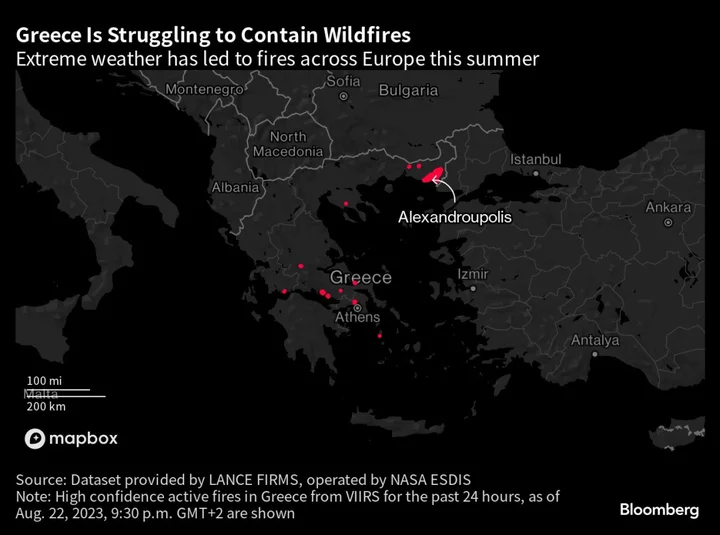
Athens Wildfires Threaten More Homes as Wind Seen Strengthening
A wildfire near the Greek capital that started on Tuesday continued to destroy parts of the forest in
2023-08-24 15:46

Wall Street’s Only Research Firm With ‘Sell’ on Nvidia Gives In
The last research firm with the equivalent of a “sell” rating on Nvidia Corp. is throwing in the
2023-08-24 15:24

Turkey Keeps Key Shipping Route Closed as Wildfires Rage Nearby
Turkey kept shipping traffic through the Dardanelles Strait suspended for a second day because of wildfires in the
2023-08-24 15:19
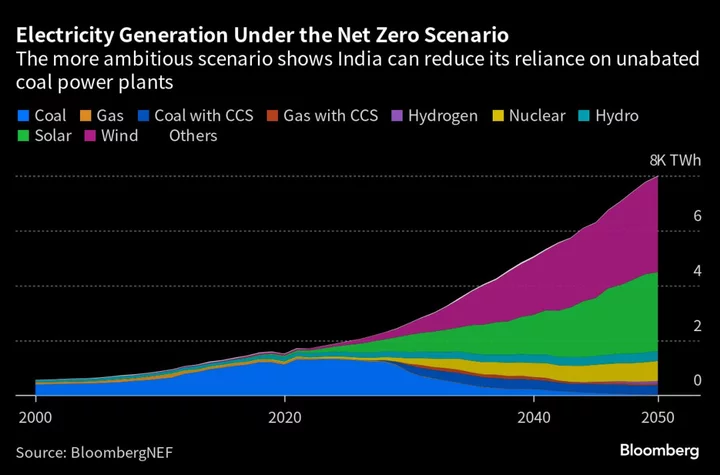
India Needs $13 Trillion to Hit Net Zero Emissions by 2050
India will need to invest $12.7 trillion in its energy system, or more than three times its gross
2023-08-24 14:58
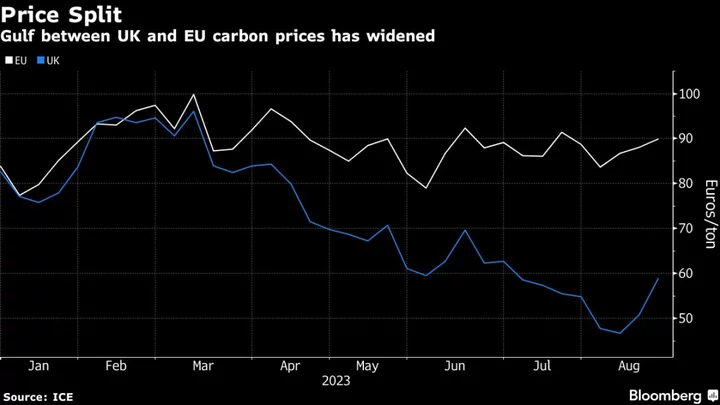
UK Steel Industry Faces Hit From Post-Brexit EU Climate Levy
Britain’s steel exports to the European Union risk being hit with a climate surcharge after the government made
2023-08-24 13:55
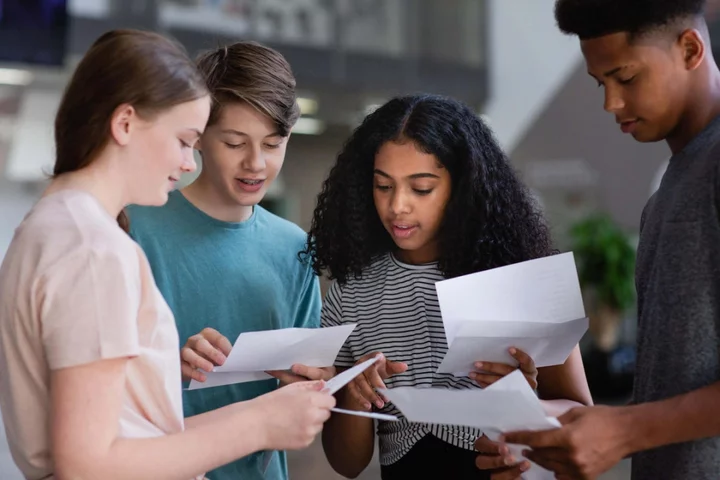
How to help your teen with comparison culture on GCSE results day
Whether your child’s GCSE results are high, low, or somewhere in between, one thing is inevitable – they’ll compare them with their friends’ grades. This comparison culture, which is far more pervasive because of social media, can leave teens feeling inadequate because their results are worse than their mates, or make their friends feel useless if roles are reversed. But although there’s no getting away from teenagers comparing their results both on and offline, what can parents do to try and limit the damage this it can cause? Former teacher Dr Julia Clements, principal educational psychologist at the children’s mental health charity Place2Be, says the comparison of results will undoubtedly impact some teenagers’ wellbeing. “Your teenager is bound to compare their results with their peers at the same school, but also through social media,” she acknowledges. “Although this comparison is inevitable, it may be harmful for your child’s wellbeing – especially if they’ve not done as well as expected. “Indeed, the term ‘compare and despair’ can be especially pertinent on days like today.” Sharon Davies, CEO of Young Enterprise, a charity which helps young people navigate the changing world of work, adds: “The pressure to measure up to their friends’ achievements can be overwhelming, leading to feelings of inadequacy or disappointment.” So how can parents help their teens? 1. Ask how they feel If your child is down on themselves and rating themselves negatively in comparison to their friends, they may reject any positives and praise parents provide, Clements warns. “It may be more useful, in the first instance, to ask them how they’re feeling, and to acknowledge and validate difficult feelings,” she advises. Such feelings may include disappointment, sadness, anger, shame, or feeling as if they’ve let themselves – and you – down. “If your child is feeling like this, it’s important to give them the message that you love them unconditionally and you’re proud and pleased to be their parent because of who they are – not because of the grades they achieve,” she stresses. 2. If they’ve done better than their friends… If your child has achieved good results, which may be better than some of their friends, then they’ll want to celebrate. But while celebrating is of course a great idea, Clements suggests: “You may want to talk with them about how to be sensitive and compassionate towards their friends who haven’t done so well.” 3. Help them turn a negative into a positive Consultant clinical psychologist Dr Nihara Krause specialises in teenage mental health and is working with the Talking Futures campaign to help parents engage their children in meaningful conversations about their futures. She says if a young person doesn’t get the grades they were hoping for, they may be highly critical of their performance in comparison to their peers. But she suggests parents show them how to turn their negative thinking around. “Parents should encourage their children to focus on recognising the approach they took to exams this time round and take steps to reflect on what they could do to achieve a better result in the future. Focus on what helps a young person gain their own personal best, no matter how their results compare with others.” 4. Don’t ask about their friend’s results or post about them Krause says parents should try to celebrate their child’s achievements for what they are and avoid asking about their friends’ results. “To avoid comparison, parents should also avoid sharing their child’s results on social media,” she says. 5. Don’t be too hard on yourself Clements points out that comparison culture may not just affect teenagers – if their results aren’t as good as expected, mums and dads might start comparing their own parenting during the revision and exam period with other parents whose kids have got better results. “As a parent or carer, you may also be drawn into unhelpful comparisons with others,” says Clements, “and you may question the amount of support you were able to provide your child in the run up to their exams. However, today is not a day for self-criticism or judgements – some self-compassion is important at this time.” 6. Reach out for support This might be the first results day many parents have gone through with their child, and while comparisons with other teens may well have been unhelpful, Davies points out that schools will have career advisers and teachers available who can offer support and advice. There are also online forums and blogs where those in similar situations share their experiences. She says: “No-one is expecting you to have all the answers – that’s why there’s support available.” Read More Charity boss speaks out over ‘traumatic’ encounter with royal aide Ukraine war’s heaviest fight rages in east - follow live Women more severely affected by ME, study claims 4 hacks to get teens off the sofa and get active – as study warns of heart damage Taking adult education classes may lower risk of dementia, study suggests
2023-08-24 13:47

Chandrayaan-3: India lunar rover Pragyaan takes a walk on the Moon
Chandrayaan-3's rover Pragyaan exits Vikram lander and takes first steps near the little-explored south pole.
2023-08-24 13:27

‘I Don’t Want to Go Home.’ Europe’s Housing Is Not Heat-Ready
Emily Wilkie’s introduction to motherhood has been monopolized by heat. A 34-year-old charity director, Wilkie lives in London
2023-08-24 13:23

Nvidia’s Strong Delivery on AI Jumpstarts Asian Chip Stock Rally
Asian semiconductor stocks got a fresh boost from a stellar set of results at Nvidia Corp., the standard
2023-08-24 12:21
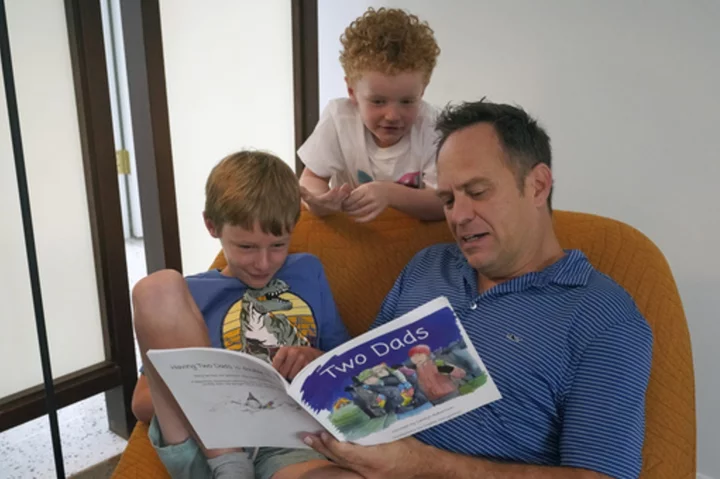
Bans on diverse board books? Young kids need to see their families represented, experts say
Across the country, books and lessons that represent different families and identities are increasingly the target of conservative pushback — even when they're for the youngest of learners
2023-08-24 12:19

Extreme Climate Change Could Cut Australia GDP By $274 Billion
Australia could face economic losses of as much as A$423 billion ($274 billion) in reduced productivity if global
2023-08-24 11:55
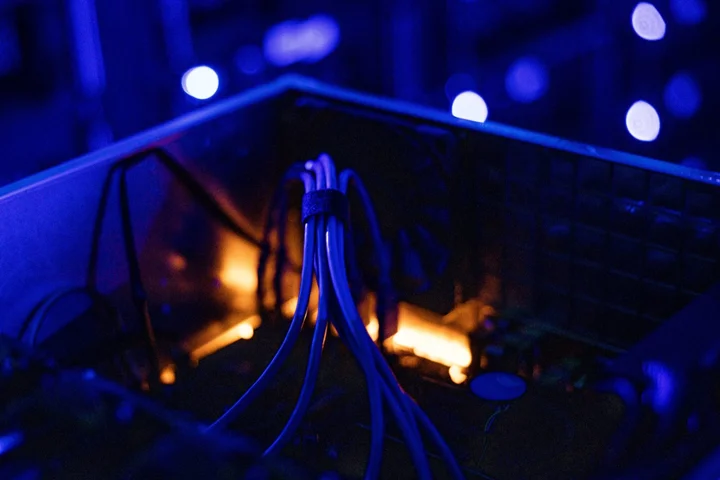
SEC Crackdown Spurs Bitstamp to Stop US Crypto Staking Service
Bitstamp, one of the oldest digital-asset exchanges, will discontinue staking services in the US amid a crackdown on
2023-08-24 11:54
